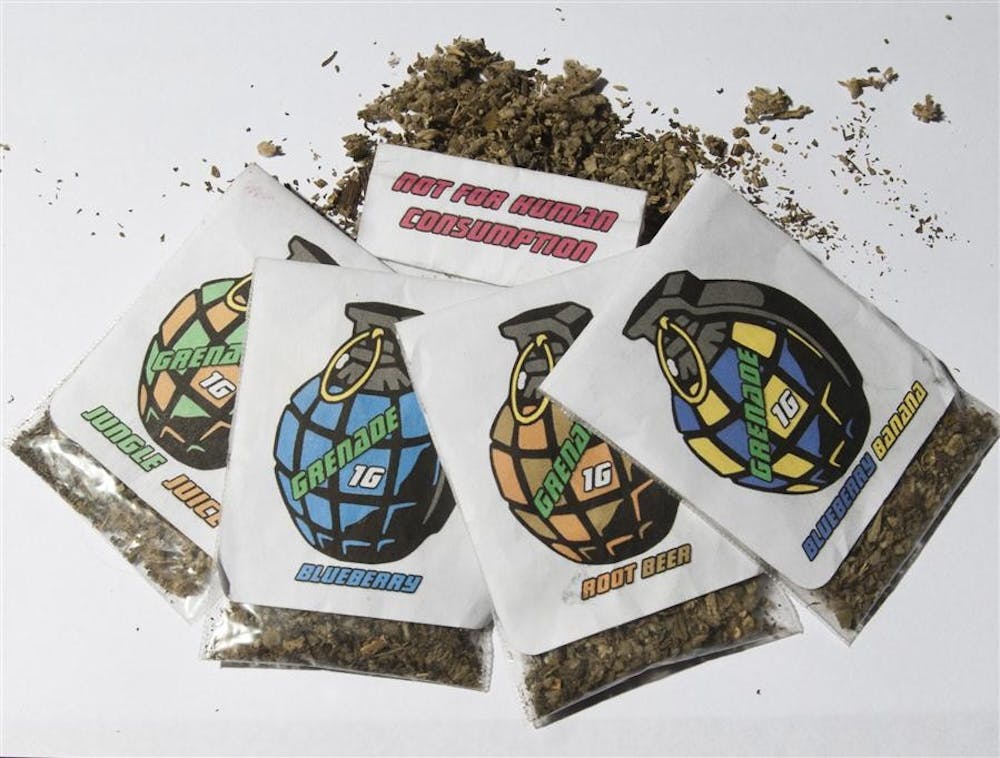Users of synthetic marijuana, which is commonly sold by many names including Spice and K2, should have all eyes and ears on Indiana’s Senate Bill No. 57, which may make the product illegal in a statewide ban that could be signed by Gov. Mitch Daniels as early as April.
If it becomes law, Senate Bill No. 57 would make it as much a crime to possess or sell Spice-related products as it is to possess or sell marijuana, according to the Indiana General Assembly’s website.
“All we did in the law, in about 20 something pages, is wherever marijuana is listed, we put this right next to it,” primary bill author Sen. Ron Alting, R-Lafayette said regarding the newly proposed bill.
The primary challenge with changing its legal status lies in the multitude of potentially countless number of chemical compositions that can be used to develop synthetic marijuana. Each of these compositions must be explicitly stated in the legislation in order to make synthetic marijuana illegal across the board.
The current bill lists more than a dozen chemical compositions that would become illegal if it garners enough votes to pass the Indiana Senate and Indiana House of Representatives and is signed by Gov. Daniels.
“We have listed in the bill what chemicals this applies to,” said State Sen. Patricia Miller, R. Ind., one of the authors of the bill. “And if we have to come back and add more chemicals we can do that.”
Alting said he insists they have gone above and beyond to include as many of these chemical compositions as possible.
“The federal government is looking at banning five components; our bill has 19,” Alting said. “So we are way above what most states and what the federal government recognizes.”
He agreed with Miller’s statement suggesting amendments will most likely need to be added throughout time to close any loopholes.
“We are under the understanding that without question we will need to come back and continue to add components ... we are willing to do that,” Alting said.
On Tuesday, the bill was unanimously passed in the Committee on Corrections, Criminal and Civil Matters.
Miller said she is optimistic the bill will have no trouble passing in the Senate— which can happen no earlier than next week, and eventually the House of Representatives in March — when the two chambers will swap each other’s bills before legislation heads to the Governor’s desk.
Last August, a county ordinance banned the sale of synthetic marijuana in Morgan County.
However, Morgan County Prosecutor Steve Sonnega said because the bans are currently not statewide, offenders will not go to jail or receive a criminal record for violations.
“It is civil only, not criminal,” Sonnega said. “I have no enforcement authority over this.”
The Morgan County law, which is similar to that of the other counties who have banned the substance, states that it is illegal to market, deliver and manufacture, making it directed toward the merchant more than the consumer, Sonnega said.
The fine in Morgan County currently stands at a maximum of $2,500 for the first offense and $7,500 for subsequent offenses.
Since its ban in Morgan County, Sonnega said business owners have been compliant in refraining from selling Spice-related products.
Kocolene Marketing LLC., located in Seymour, Ind., owns and operates 19 tobacco stores and 12 convenience stores throughout Indiana and Kentucky — including a Smokers Host location in Martinsville and one in Mooresville, Ind.
Until Aug. 17 of last year, the company carried the synthetic marijuana brand “Chill Spice” in their stores.
Executive Vice President Andrea Myers said a corporate decision was made to pull the product from their shelves — although she claimed they were unaware of the Morgan County ban on synthetic marijuana that would take effect about a week later.
“A couple of our managers called me and said ‘I think customers are not using this as incense.’” Myers said. “We made a corporate decision consistent with our 73-year history of being a good corporate citizen ... so we pulled it.”
Synthetic marijuana may be outlawed in Indiana

Get stories like this in your inbox
Subscribe





